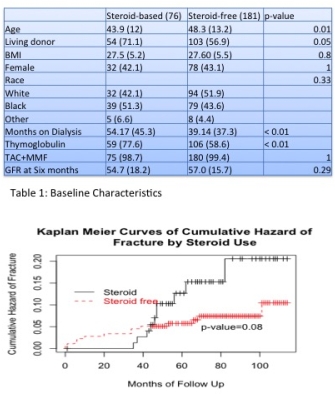Steroid Use May Not Increase Risk of Fracture in Kidney Transplant Patients.
N. Sarabu, K. Kucharski, D. Hricik, A. Padiyar, A. Huml, J. Augustine.
Internal Medicine, Division of Nephrology, University Hospitals Case Medical Center, Case Western Reserve University, Cleveland, OH.
Meeting: 2016 American Transplant Congress
Abstract number: B240
Keywords: Bone, Immunosuppression, Kidney transplantation
Session Information
Session Name: Poster Session B: Kidney: Cardiovascular and Metabolic
Session Type: Poster Session
Date: Sunday, June 12, 2016
Session Time: 6:00pm-7:00pm
 Presentation Time: 6:00pm-7:00pm
Presentation Time: 6:00pm-7:00pm
Location: Halls C&D
Introduction: Chronic steroid use is associated with bone mineral loss, and osteoporosis. However, it is not clear if chronic steroid use in post-kidney transplant patients increases risk for fractures. We studied incidence, and risk of fractures in kidney transplant patients who were on maintenance steroid regimen and early steroid withdrawal regimen.
Methods: We retrospectively reviewed medical records of patients who received kidney transplants at our center between 2006, and 2011 for fractures. Both axial, and appendicular skeleton fractures were recorded. Chi-square test, logistic regression model, and Kaplan Meir survival methods were used to compare incidence, and risk of fractures between patients on steroid, and early steroid withdrawn immunosuppression.
Results: There were 76 and 181 patients in steroid-based, and steroid-free groups.Patients in steroid-free group were significantly older, had lesser dialysis vintage, lesser rate of Thymoglobulin induction. 10 patients in steroid-based, and 13 patients in steroid-free group experienced fractures during a mean follow up of 6.1 years. Relative risk of fractures in steroid-free group was 46% lower but it was not statistically significant (p-value=0.11). Multivariate logistic model also showed non-significant association between steroid use, and fracture incidence. At 1 and 5 years, fracture-free survival was 97% and 94% in steroid-free compared to 100%, and 88% in steroid group (p-value=0.08).It should be noted that it is possible that we have a Type II error, because of lower number of fractures.
Conclusion: Steroid based immunosuppression may not be associated with higher fractures in kidney transplant patients compared to early steroid withdrawn patients. However, we need larger studies to assess the effect of steroid use, including cumulative dose effect on fracture occurrence in kidney transplant recipients.
CITATION INFORMATION: Sarabu N, Kucharski K, Hricik D, Padiyar A, Huml A, Augustine J. Steroid Use May Not Increase Risk of Fracture in Kidney Transplant Patients. Am J Transplant. 2016;16 (suppl 3).
To cite this abstract in AMA style:
Sarabu N, Kucharski K, Hricik D, Padiyar A, Huml A, Augustine J. Steroid Use May Not Increase Risk of Fracture in Kidney Transplant Patients. [abstract]. Am J Transplant. 2016; 16 (suppl 3). https://atcmeetingabstracts.com/abstract/steroid-use-may-not-increase-risk-of-fracture-in-kidney-transplant-patients/. Accessed July 5, 2025.« Back to 2016 American Transplant Congress
